Sign up for our Book Club newsletter
Get the latest news, events and more from the Los Angeles Times Book Club, and help us get L.A. reading and talking.
You may occasionally receive promotional content from the Los Angeles Times.
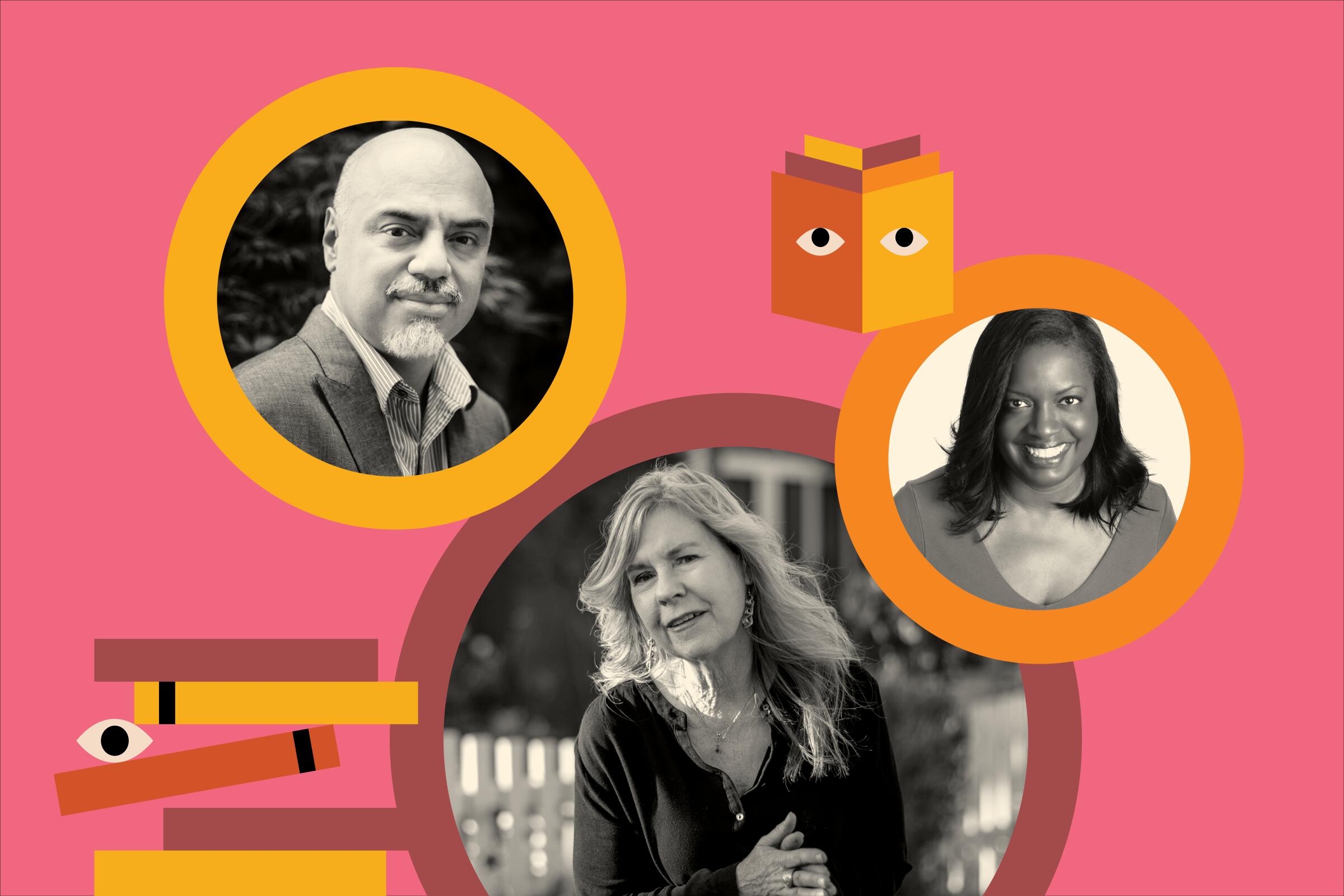
This story is part of Lit City, our comprehensive guide to the literary geography of Los Angeles.
What makes a writer a Los Angeles writer? How much does place really affect a writer’s work? We asked Southern California writers to find out what they think.
Samantha Dunn: That’s an almost impossible question to answer without playing into stereotypes about each place. You know, L.A. is cool, O.C. is staid and ... not cool. But having lived and made my career in both places, what the heck, I’’ll try. In L.A., I think of Eve Babitz and Kate Braverman, of Wanda Coleman. When I think of O.C., I think of Richard Bausch and Ron Carlson, of Ngũgĩ wa Thiong’o. There’s also the blockbuster, commercial side, from Michael Connelly of L.A. to Dean Koontz of O.C. L.A. has a much older and broader lit scene; it’s changing in O.C., but what I have experienced here is that writers tend to work more in isolation. What communities have existed here tend to be more in the bubble of academia (like UC Irvine).
Héctor Tobar: I think of Bertolt Brecht and all his German exile friends. And Raymond Chandler, who invented a genre in L.A. And Luis Rodríguez and his wonderful memoir about gang life in the San Gabriel Valley. What makes a writer an L.A. writer? They write in Los Angeles!
Matthew Specktor: Didion, Babitz, Bret Ellis, myself? I’m not always sure it’s a compliment, “L.A. writer.” In many ways it’s a diminution, a term — like “Southern writer” — that’s meant to regionalize and reduce. Which is why I both extend that list endlessly (Paul Beatty lives here, so he’s an “L.A. writer”? Dana Spiotta is from here, Rachel Kushner lives here, so they’re both “L.A. writers”) and dismiss it out of hand. Ultimately, many writers I love are associated with a place (Jonathan Lethem has written about Brooklyn, so obviously he’s a “Brooklyn writer” — except he lives in the greater Los Angeles area too, so is he an L.A. writer likewise?). But I suppose what makes an L.A. writer is just an interest in describing this place more than anything. My friend Sam Sweet is from elsewhere, but he writes so persuasively and gorgeously about L.A. that I think of him as a quintessential L.A. writer.
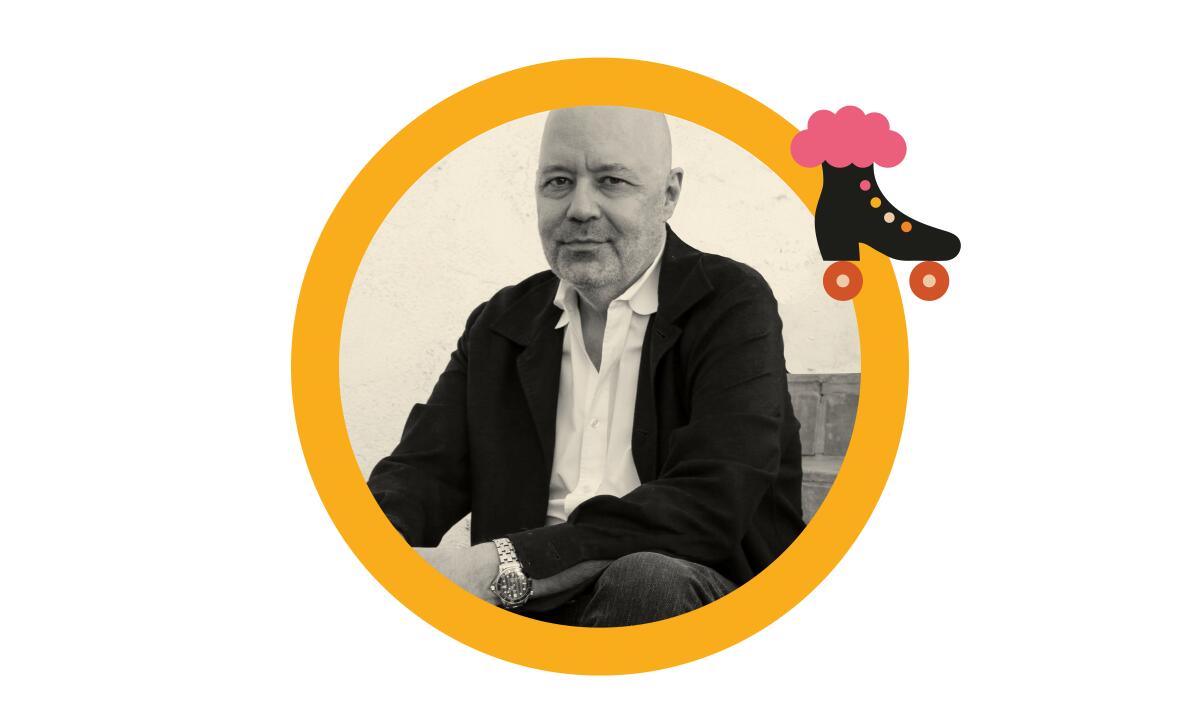
Lisa See: My mother, Carolyn See. She was born here, and every book she wrote took place right here. Her details about Los Angeles were always so specific: sloping lawns, the heat on a summer day in Topanga, the dingy beauty of a bungalow, her unremitting distaste for the Valley, the way she’d capture the unique quality of the light. But what do I think makes an L.A. or O.C. writer? The two things that come to mind are the freedom that comes from being a continent away from the publishing world and that we work way too hard. The stereotype of good weather making us all about play, leisure, surfing and whatever has always seemed wrong to me. The good weather gives us more time to write, because we aren’t raking leaves, shoveling snow, having drinks with our editors, or weekending in the Hamptons.
The Times sent a survey to dozens of authors on their favorite places and authors in Los Angeles. Their responses were (blisfully) all over the map.
Rachel Howzell Hall: Michael Connelly. (And me, ha.) Great sense of place and neighborhoods, the understanding that there’s not just “one” L.A.
Lynell George: I don’t think I can point to just one, but I can say this: For me, it is the writing that fully conveys a particular segment of the region — not just its physicality but its mood and attitude. Los Angeles is much more complex than it appears at the surface. There are so many different L.A.s that one can experience and I am drawn to the books, poetry, short stories that fully immerse me into an environment or situation that I both recognize or have been curious about because I’ve only been privy to the edges. The world is here with us, and for me that’s the joy of being an L.A. writer.
Michelle Huneven: When I think of Orange County, it’s always Victoria Patterson and her books, her short story collections “Drift” and “The Secret Habit of Sorrow,” and her prescient novel, “The Little Brother,” which all go deep into the dark side of Newport wealth. Judith Freeman’s intelligent and emotional “MacArthur Park” is a tour de force; and I especially love Mona Simpson’s “My Hollywood” for its unforgettable Filipina nanny, Lola.
Stuart Gibbs: I think all writers everywhere are cut from the same cloth. Half the L.A. writers I know are ex-NYC writers who realized that they could do the same job out here but have a backyard and get to the beach more often. Plus, L.A. writers have more studio meetings.
Aminah Mae Safi: Someone who understands what it is to make L.A. home. If we’re all superficial —holes by stereotype, then we’re superficial —holes who take care of each other and have a deep sense of community. I think most of us have a pretty good sense of humor, too. Cheesy humor. Movie humor. We’re going to need a bigger boat humor.
Elise Bryant: I can always tell when someone is writing about the area without actually having lived here. One thing that always sticks out to me is if they put “the” in front of PCH. Or if the characters easily travel between multiple neighborhoods in one day for no good reason.
Rex Ogle: Carrie Fisher. I know she worked mostly in film, but for me she’s synonymous with L.A.. L.A. is so mired in the TV/film industry, and so I think an L.A. writer is very much someone who bridges the gap between “Hollywood” and book publishing.
Kelly Yang: I think of L.A. as the ultimate place for multi-hyphenates. Everyone here is a writer-producer or a lawyer-artist, and that’s very exciting for me. I love juggling multiple hats, so this is the perfect place for me.
A guide to the literary geography of Los Angeles: A comprehensive bookstore map, writers’ meetups, place histories, an author survey, essays and more.
Jervey Tervalon: An L.A. writer? They don’t go to Beverly Hills or Brentwood.
Melissa de la Cruz: The classic L.A. writers: Joan Didion, Raymond Chandler, for sure. Also Gigi Grazer for skewering the vacuous Westside society. I think what makes someone an L.A. writer is having a real grasp of how this city runs and what powers it.
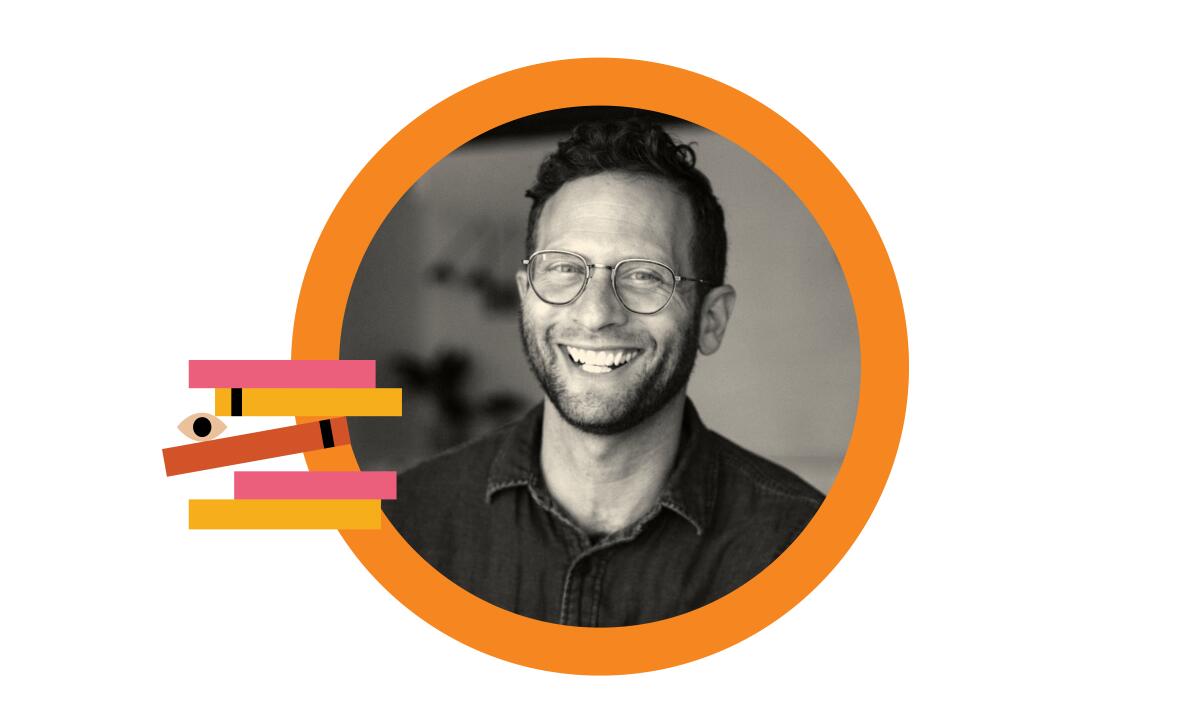
Seth Fishman: I think of the big YA crew here. Margie Stohl, Maureen Goo, Ransom Riggs, Tahereh Mafi, Victoria Aveyard, etc. That YALLWEST board. All based here.
Victoria Aveyard: It’s hard to nail down a single writer. I would say that, unlike New York, I don’t think you have to live in L.A. for 40 years to call yourself an Angeleno. It happens more quickly and you don’t have to prove yourself to anyone, because L.A. is so diverse. Chances are, you’ll find your niche in it very quickly.
Marie Lu: Ransom Riggs. I don’t know anyone else who knows more about L.A. than he does — he can point at a gas station and tell you a history about it that’s more fascinating than anything you’ve ever heard. He sees the layers of this city in the way a great writer does.
Abdi Nazemian: The first person that comes to mind is Joan Didion, who really captured the city’s magical contradictions so beautifully. I also think of all the incredible screenwriters who elevated the art form, people like Billy Wilder. I love that so many of the L.A. writers I know don’t feel beholden to a particular medium. Like Didion many of us work in many mediums. L.A. writers often go back and forth between film and television and novels and theater and podcasts. It’s an incredibly exciting time to be an L.A. writer.
David Yoon: Possibly John Darnielle (“Wolf in White Van”). I loved that he set his thriller in Pomona. He captured the bleak poetic quality I’d grown up with as a SoCal kid.
Xochitl-Julisa Bermejo: Luis J. Rodriguez, traci kato-kiriyama, Mike Sonksen, Amy Uyematsu, Rocío Carlos, Chiwan Choi, Sesshu Foster, Dana Johnson. An L.A. writer has a long history with the city, knows the neighborhoods, appreciates the different cultures, understands that L.A. is a mix of things, mixes their language and their food, finds the beauty in the grime, and is nowhere near Hollywood.
Mike Sonksen: An L.A. writer embodies the city with their spirit and specific references to streets, locations, eras of the city. A geographic literacy that indicates they really know the city from experiential living and not just reading or hearing it from secondhand stories. Wanda Coleman did it better than almost anyone. There’s also Amy Uyematsu, Pam Ward, Luis Rodriguez, Sesshu Foster, Mike Davis, Naomi Hirahara, Kamau Daáood, Gloria Alvarez, Ruben Martinez, Lynell George, traci kato-kiriyama, Chiwan Choi, Ruben Guevara.
Bridgette Bianca: When I think of L.A., I think of the poets from the World Stage like V. Kali, Jessica Gallion, Wil Doucet, and Jaha Zainabu. Poets from Da Poetry Lounge like Edwin Bodney, Alyesha Wise, Matthew Cuban, Yesika Salgado, and Shihan [Van Clief]. I think of poets like Mike Sonksen and Lynne Thompson. I think of novelists like Eric Jerome Dickey, Walter Mosley and Dana Johnson. And, of course, I think of me.
L.A.’s authors, from 19th century novelists to Wanda Coleman to Steph Cha, have always pushed genre boundaries and dissected California myths.
Raphael Simon (a.k.a. Pseudonymous Bosch): It’s hard to separate L.A. writers from the noir tradition of James M. Cain and Raymond Chandler. Even Joan Didion is sometimes noirish. But maybe the new kidlit insurgency will replace brooding detectives with plucky kids and angsty teens as the archetypical L.A. literary heroes and heroines.
Marisa Urrutia Gedney: I think of Vickie Vértiz. To me, writing is Southeast L.A., and she tells those tales of justice and reality and history and comedy so well.
Stephan Lee: I’m a former journalist, which means many of my friends are former journalists, which means many of my friends are current TV writers or aspiring TV writers. Even though there are plenty of L.A. authors with zero aspirations to write for screen, I generally perceive L.A. authors as more willing to define their identity as a writer more broadly — it’s not that they’re strictly a writer of books or magazine pieces, but a writer who sees themselves as having a point of view that can be applied to TV, film, narrative podcasts, etc. I don’t know if this is a New York/L.A. thing, but I’m a writer who likes taking meetings and who enjoys pitching and the whole hustle ... I feel like I’ll find more kindred spirits here!
Vickie Vértiz: I think of Sesshu Foster, I think of Marisela Norte, I think of Gloria Alverez, I think of Wanda Coleman, I think of Mike the poet Sonksen, I think of the last poets, but there are dozens and dozens I can name, because I know them. That’s the problem with questions like this is that there is no one person, but we like to think there is. And of course I’m forgetting Luis Rodriguez, and our current poet laureate, and I forgot Robin Coste Lewis, and Yesika Salgado, Carribean Fragoza, and also myself. Oh and féi hernandez of course.
Antoine Wilson: I don’t think that defining someone as an L.A. or O.C. writer is particularly useful. Because there are so many phenomenal writers here who, having come from other places or tending to write about other places, seem not to belong to that category — but by virtue of where they actually do their work, and what literary community they participate in, definitely do.
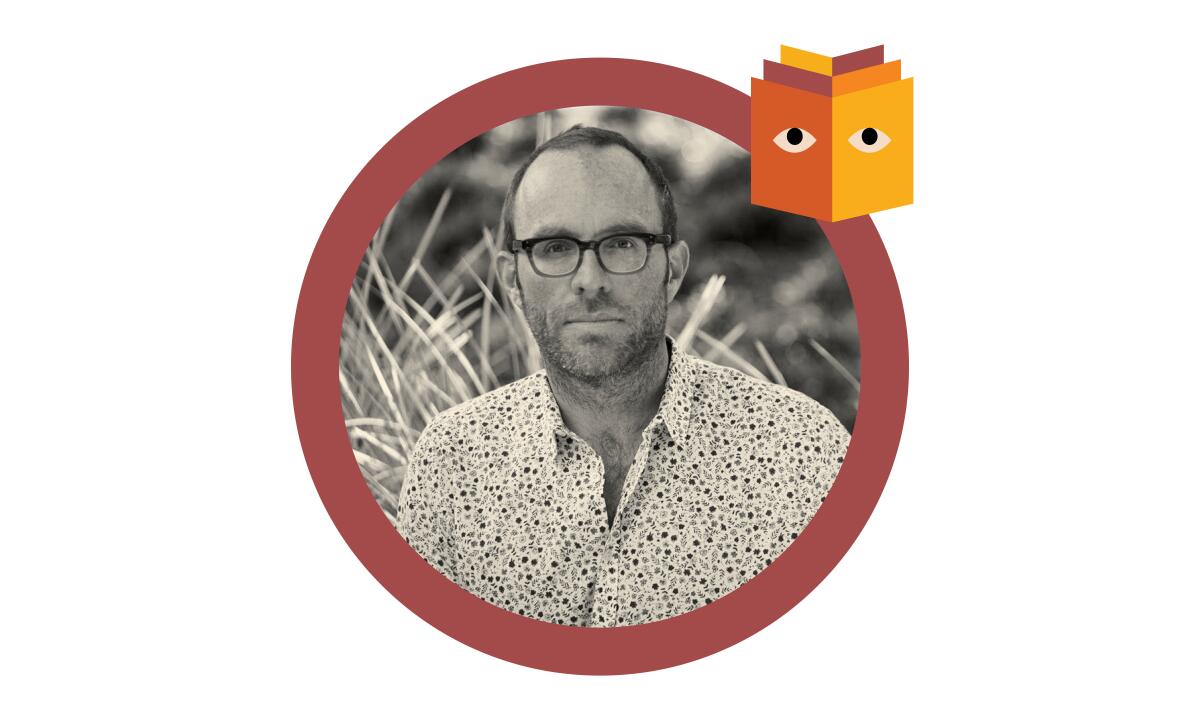
Samantha Dunn: Impossible question. I’ve been in Southern California since 1989 and I feel like 3/4 of them are my personal friends. But if I must, it’s my dear friend Janet Fitch, who not only handled her immense success with “White Oleander” with grace and generosity to her fellow writers, but who has spent the last couple of decades nurturing other voices and supporting the growth of the literary community. A true class act. And you haven’t even factored in Riverside County, as if that doesn’t exist in the literary equation. (The answers there are Susan Straight and Tod Goldberg.)
Tod Goldberg: Susan Straight. Susan is able to capture the missing and the forgotten people of Southern California so well, and she’s been doing it for 35 years. Because she often focuses her lens to the east, in the wardens of the Inland Empire, her characters tend to not be focused on the concerns found between La Brea and La Cienega, but they are the fabric of this region, and Susan conveys them with beauty, sadness, and hope. I think she’s the true bard of Southern California and has been for a very long time.
Lisa See: If I have to choose one, it would be David Ulin. Although he’s a transplant, he always writes beautifully, thoughtfully, knowledgably and incisively — four attributes that don’t always go together — about our city. He’s an exceptional critic and keen observer.
Rachel Howzell Hall: Steph Cha — she understands and appreciates this city. As a high-visibility writer, she’s always championing other L.A. writers.
Eve Babitz, the author known for chronicles of L.A. drawn largely from her life, died last week at 78. See our full coverage past and present
Lynell George: This is hard, but I think I would have to say Wanda Coleman was the person who set down a very particular Los Angeles on the page that I recognized — the voices, the rhythms, the colors, the music, the heartbreak, the churning urban and the resilient nature. Her example lit a path for me as a writer.
Stuart Gibbs: The author I have most modeled my own writing style on is Michael Crichton. I read “Congo” in middle school and was hooked. He’s the one who taught me that you could combine science and adventure, which is something I have tried to do ever since. Plus, if I could ever manage that #1 bestseller, #1 TV show and #1 movie at the box office trifecta like Crichton ... well, that wouldn’t be so bad.
Julie Buxbaum: I’m going to go with Sarah Mlynowski because she is the first person I call with any publishing or career issue. She’s generous with her time and wisdom, and has helped me so much with the business side of my career. I didn’t realize before becoming a novelist that it’s like owning a small business, and so I truly admire Sarah for her ability and generosity in helping me (and so many other writers!) navigate that tricky terrain. It’s like she has a superpower!
Michelle Huneven: The poet Martha Ronk, for her fearless experimentation, her intelligence, her poise, her poems.
Elise Bryant: Christina Hammonds Reed. “The Black Kids” made me feel so seen as a Black girl who grew up in L.A. County, in a way I never experienced reading a book before.
Jennifer L. Holm: When I think L.A., I think picture book creators. Dan Santat, the Caldecott medalist, is the ultimate L.A. author/illustrator imho. He’s a sweetheart.
Kayla Cagan: Right now, I’m loving Taylor Jenkins Reid because of “Malibu Rising,” one of my favorite books of 2021. Julie Buxbaum’s “Admission” made a huge impression on me, too, and that is a good YA/Adult crossover. Another favorite of 2021. Really admire her attention to setting detail.
Victoria Aveyard: Mindy Kaling. What she’s done as a women in a male-dominated industry is inspiring, and I love her work. She’s a fellow gal from Massachusetts too.
Jean Chen Ho: Eve Babitz for her love of the city and her humor.
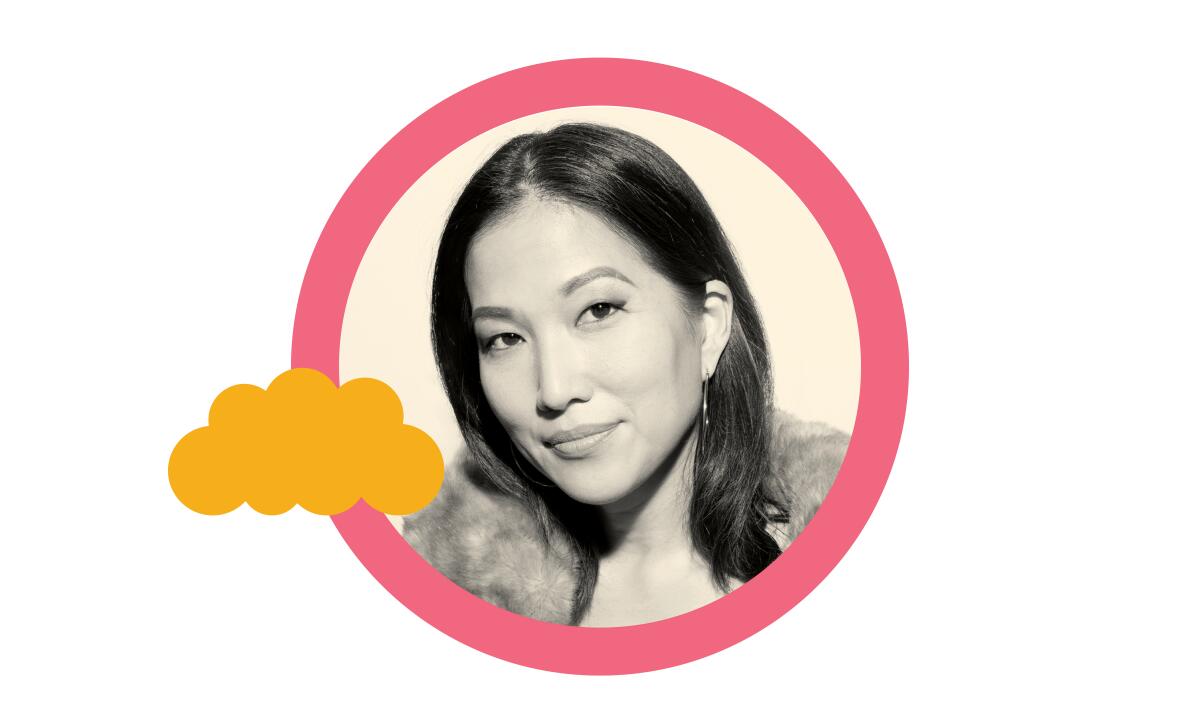
Margaret Stohl: Raphael Simon a.k.a. Pseudonymous Bosch. Because he’s a blazing genius and has been since we were 14 at Uni High.
Abdi Nazemian: I admire my friend Richard Kramer, who wrote my favorite season of television ever (“Tales of the City” Season 1, go watch it) and also wrote a stunning novel (“These Things Happen”). I always admired him as a writer, but most of all, I admire him for being willing to be a mentor. I started writing novels because I couldn’t seem to get any of my projects about Iranian life made in Hollywood, and I needed to find a medium that let me express who I am. Richard was willing to read drafts of my work, give me honest feedback, and crucially, he helped me see myself as a novelist. We need more mentorship in the world of writing.
L.A.’s lonely? Authors are introverts? Don’t believe it. From a San Gabriel food club to a YA bash, meet the writers of the city in five scenes.
Mike Sonksen: Kamau Daáood because his poetry is about uplifting the community. He is not self-centered or focused on his own fame. He is a community artist that has used poetry for 50 years to celebrate everyday people and the heart and soul of the city. Kamau’s poetry rages against racism and injustice and makes it into music.
Maryrose Wood: I recently read and loved Matthew Specktor’s “Always Crashing in the Same Car.” Hollywood is one thing to the world, quite another to those who grew up in it. Terrific, deeply personal writing full of thoughtful takes on the tension between East Coast vs. West Coast, books vs. movies, success vs. failure, and more.
Cherisse Yanit Nadal: Octavia Butler because she knew. And when I say “she knew,” I mean that I am stunned by the breadth and depth of how she was able to predict the things that came to pass in the last few years through her published writing and in her personal writings. She also wrote in a way that I found to be accessible as a young person and described the Los Angeles and Pasadena that I’ve known and lived in my entire life. And she was just brilliant and amazing.
Steven Banks: Ray Bradbury. He was positive and inspiring and worked hard and knew that Walt Disney was a genius.
Jervey Tervalon: Jonathan Gold. He thought of L.A. as whole and not a series of depressing suburbs. When I’d go out with him I didn’t know if we were going to Brentwood or Crenshaw and I didn’t care.
Lauren Kate: Francesca Lia Block was one of the first writers I came to know as a specifically L.A. writer. Her lyricism and sensuality feels particularly Angeleno.
Sign up for our Book Club newsletter
Get the latest news, events and more from the Los Angeles Times Book Club, and help us get L.A. reading and talking.
You may occasionally receive promotional content from the Los Angeles Times.